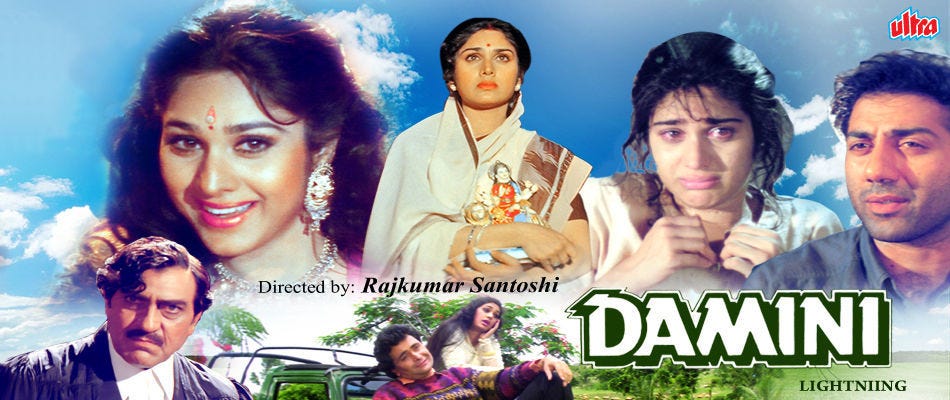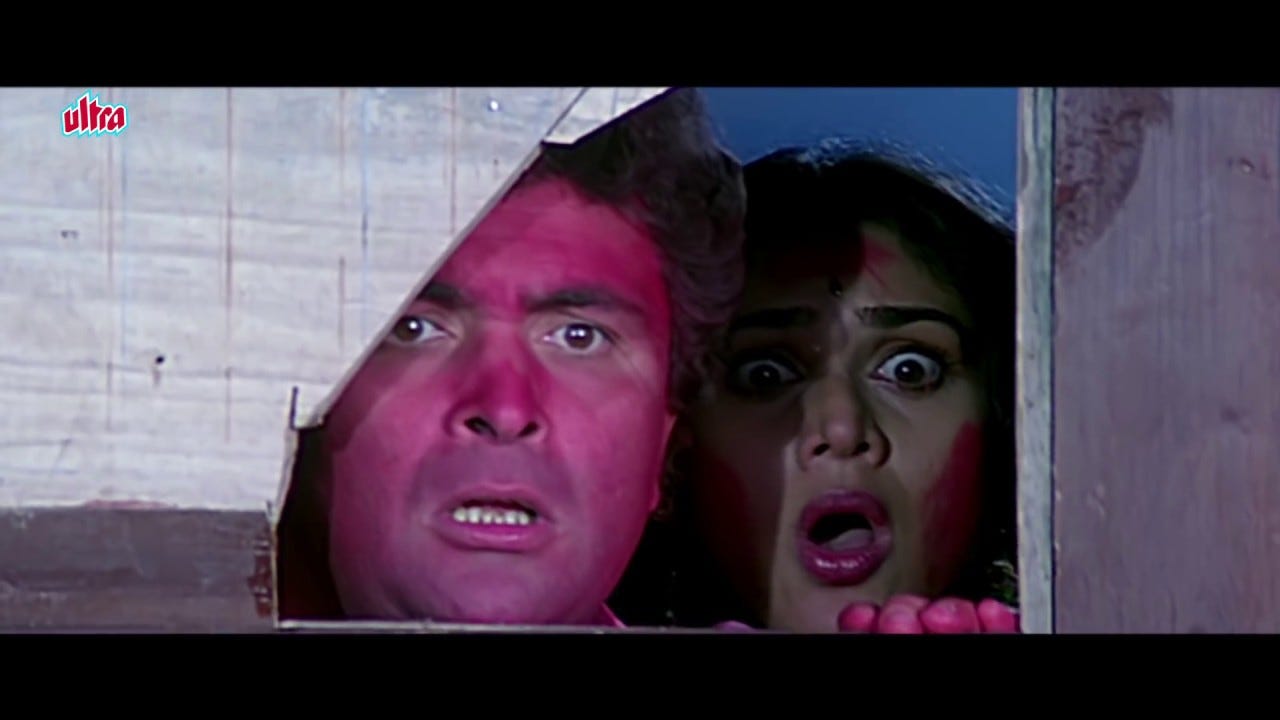Feb 7, 2022
Brief encounter: What Rajkumar Santoshi’s ‘Damini’ gets right about the prosecution of rape
Adrija Jayanti

The movie is a classic for its progressive feminist outlook and realistic portrayal of the Indian justice system.
For those who haven’t seen Rajkumar Santoshi’s Damini (1993), about a woman who seeks justice after witnessing her house help being raped, I recommend saving this essay for after you have watched the movie.
That said, everybody should consider watching or rewatching Damini in 2018 for its progressive feminist outlook as well as its realistic portrayal of the Indian justice system.
Damini is about a woman who is unable to compromise on her ethics while standing up for another woman who has been raped. The frantic opening scene has Damini (Meenakshi Sheshadri) running through the corridors of a building on a stormy day. We see flashes of a man drenched in Holi colours. Damini is desperately looking for an exit but a nurse appears and drags her away, and she is interrogated by a doctor.
We jump time and place and go to a dance number where we are shown a very different Damini — one who is cheerful, exuberant and performing on a stage. Shekhar (Rishi Kapoor), a member of the audience, falls in love with Damini, and they get married.
At her new home, Damini befriends the house help, Urmi. During Holi, Damini comes across her brother-in-law, Rakesh, and his four friends trying to forcefully apply colours to Urmi. Damini articulates the idea of consent, explaining that Urmi has clearly asked them to stop since she doesn’t want colour on her. Damini’s assertion is also the law on rape in India. When any man has sexual intercourse with a woman against her will or without her consent, the act is seen as rape under Section 375 of the Indian Penal Code, 1860.

Shortly after, Damini hears Urmi’s cries and finds the men taking her away. They begin to rape Urmi in a locked room. Damini frantically tries to gather help, and is able to find Shekhar. He smashes a hole in the door of the room and the two clearly witness the rape. The four men see Damini and Shekhar and decide to take Urmi somewhere else. Damini faints at this sight. The driver and another person see the four men shoving Urmi into a car, which they later abandon somewhere. Urmi is eventually found by the police.
Damini should have called 100 for the police when she saw Urmi being raped. The police would have arrived on the scene to either stop the crime or collect evidence without a chance of it being tampered. However, Damini is unable to report the crime since Shekhar convinces her against it.
The police investigation starts, and they interrogate members of Shekhar’s family. Shekhar forces Damini to lie, and the family covers up the incident, saying that Urmi wasn’t working on the day of the rape. The police investigation continues, but the police officers are corrupt and try and persuade Damini to give evidence against her family.
Damini goes behind Shekhar’s back to visit Urmi in the hospital. Seeing Urmi’s grievously injured state, Damini decides to give evidence against her family. Under section 161 of the Criminal Procedure Code, 1973, a statement can be made to the police by a witness.
Damini’s statement leads to the arrest of Rakesh and his friends. Usually, before the police can arrest any person, they need permission from the magistrate to do so. This is known as a warrant. However, for more serious crimes, the police can arrest without taking permission from the magistrate. For rape cases, a warrant is not required.
In a scene in which Damini visits Urmi in the hospital, the press are interrogating Urmi and her grandfather in an intrusive and insensitive manner. They try to capture Urmi in a video, but are stopped by Damini who, in this case, is functioning like the law, wherein under section 228 Aof the Indian Penal Code, the identity of victims of rape is not to be revealed by any media. The punishment for doing so is imprisonment for two years and a fine.
Eventually, the case reaches the court. Usually, criminal cases are prosecuted by the State. After arrest, the accused is put in a police lock-up. The accused is then produced before the magistrate within 24 hours. To apply for bail, the accused’s lawyer will appear before the magistrate.
For bailable offences, bail is given on submitting the bail application. However, for non-bailable offences, the magistrate can decide whether the accused deserves bail or not. The case is usually between the State and the accused and each lawyer makes arguments on behalf of their client. They examine witnesses and cross-examine the other side’s witnesses.
Hotshot lawyer Indrajith Chadha (Amrish Puri) represents Rakesh. Chadha speaks eloquently, articulating his argument significantly better than the public prosecutor, who barely manages to make a coherent argument.

An accused is considered innocent until proven guilty. However, the burden of proof in rape cases is on the accused. Chadha bullies Damini’s father and attempts to discredit her as a witness by pointing out that she becomes hysterical around colours and is not mentally sound, therefore her testimony can’t be relied on. Chadha intimidates Damini so that she is unable to give a correct account of the event. The judge doesn’t question Chadha’s arguments and rules that Damini should be put in a mental hospital for two weeks. The court date is postponed until the doctors diagnose Damini’s mental condition. Shekhar is emotionally blackmailed by his father into not trying to get her out of the hospital.
Damini escapes the asylum and runs into Govind (Sunny Deol), a disillusioned lawyer. He agrees to represent Damini. In a scene in which the police apprehend Damini in a market, Govind comes to her rescue. The police claim that they have a warrant to arrest Damini. Govind says that he has a stay order, which he had obtained from the court to prevent the arrest.
Before the next hearing, Urmi is found dead in the hospital. The police claim that she wrote a suicide note in which she said that she killed herself because she was unable to bear the pain of her injuries. However, Govind and Damini deduce that Urmi has been killed because she was illiterate and could not have written the note. The letter was found in her bloodied hand and yet didn’t have a drop of blood on it.
In the next hearing, Govind breaks down Chadha’s arguments. He points out that Chadha had claimed that Damini was insane, but was also equally capable of accusing Rakesh and his friends of rape after being unable to extract money from the family. After Chadha’s arguments are contradicted, he pretends to have a health issue, and the hearing is pushed to another day. In the meantime, Chadha and his cohorts attempts to kill Damini and Shekhar.
The next day, the court waits for Damini to arrive. When she is late, Chadha suggests that she has run away and demands yet another date. This is where Govind explodes into his “Tarikh par tarikh” speech, which is still the best description of the delays in the legal system and is as pertinent now as it was in 1993.

Damini finally arrives in court. When she hears that Shekhar’s life is in danger too, she gives an impassioned speech about the problems of the legal system. She says that she doesn’t want to establish any truth in a system that does not want to listen to the truth. She talks about the insensitivity of lawyers towards Urmi. She laments that she probably is insane for having thought of getting justice for Urmi. This frustration is all too common among anybody who has interacted with the legal system.
However, in true Bollywood style, Shekhar enters the court to reveal the truth. The judge finally convicts Rakesh and his friends. They are sentenced to seven years of imprisonment for the offence of rape. Shekhar’s family members are sentenced to two years of imprisonment for hiding the offence. The lawyer is also given a seven-year imprisonment for Urmi’s murder.
Section 376D of the Indian Penal Code deals with gang rape, for which the punishment is minimum of 20 years and a maximum of life imprisonment and compensation for the woman. This provision has come after the 2012 Delhi gang rape through the Criminal Law (Amendment) Act, 2013.
The court absolves Shekhar for coming through and helping the judge by honestly giving evidence about the rape. However, this is against perjury laws in India. Section 191 of the Indian Penal Code, 1860, states that giving false evidence under an oath when a person knows that this statement is not false can be punished. Shekhar had committed an offence by not stating the true facts of the rape incident. The court should have convicted him.
The reality in Indian courts is also that they often do not convict people for perjury. However, people are not lauded for finally admitting to the facts that they know after repeatedly lying in court.
The judge praises Damini for having the courage to stand up for the truth. She receives a standing ovation. Govind shakes hands with a few people, collects his legal papers, and disappears alone through the doors of the courtroom unnoticed, his work accomplished as the crowd presses on Damini and Shekhar.
This post was simultaneously posted on scroll.in at https://scroll.in/reel/881303/brief-encounter-what-rajkumar-santoshis-damini-gets-right-about-the-prosecution-of-rape